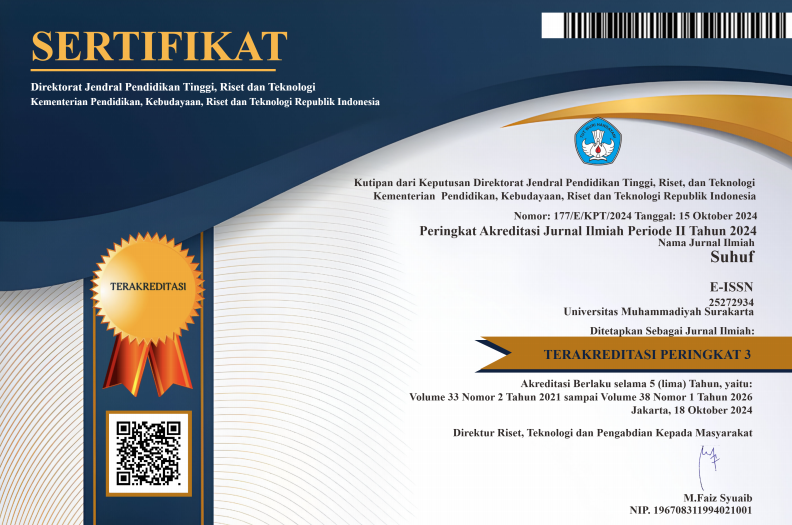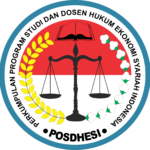Editorial Board Reviewers Peer Review Process Author Guidelines Publication Ethics Generative AI Policies Open Access Policy Plagiarism Policy Focus and Scope Article Processing Charge Abstracting and Indexing Contact Journal Metrics Digital Archiving Scopus Citation
Focus and Scope
The Suhuf Journal is dedicated to publishing high-quality, in-depth analyses and scholarly research in key areas of Islamic Economics and Finance, Islamic Education, Qur'an and Sunnah Studies, and the unique aspects of Islam in Indonesia. We aim to provide a platform for academic discourse, innovative research, and insightful debates that contribute significantly to these fields.
Islamic Economic and Finance
- Fundamentals: Exploring the core principles and theories underpinning Islamic economics and finance.
- Trends and Opportunities in Islamic Finance: Investigating the evolving landscape, emerging trends, and growth opportunities in Islamic finance globally.
- Islamic Banking and Financial Markets: Analyzing the operations, products, and services of Islamic banking and its impact on global financial markets.
- Risk Management: Delving into risk assessment and management strategies in the context of Islamic financial principles.
- Islamic Social Finance: Examining the role of Islamic social finance tools like zakat, waqf, and microfinance in fostering socio-economic development.
- Financial Planning: Addressing Islamic perspectives on financial planning, wealth management, and personal finance.
- Legal and Regulatory Issues: Discussing the legal frameworks, regulations, and compliance issues in Islamic finance.
Islamic Education
- Pedagogy: Investigating teaching methods and practices in Islamic education.
- Educational Technology: Exploring the integration and impact of technology in Islamic educational settings.
- Student Learning: Focusing on student engagement, learning processes, and outcomes in Islamic education.
- Education Policy: Analyzing policies and reforms shaping Islamic education systems.
- Teacher Education: Addressing the training, development, and professional growth of educators in Islamic educational institutions.
Qur'an and Sunnah Studies
- Qur'anic Studies: Delving into the exegesis, historical context, and interpretations of the Qur'an.
- Tafsir Studies: Analyzing classical and contemporary tafsir literature.
- Hadith Studies: Examining the collection, authentication, and interpretation of hadiths.
- Comparative Studies: Assessing the influence and interpretation of Qur'anic and Sunnah studies in Muslim-majority countries and in the Western context.
Islamic Law (Shariah)
- Fundamentals of Islamic Jurisprudence (Fiqh): Exploring the principles, sources, and methodologies used in Islamic jurisprudence.
- Contemporary Applications of Shariah: Investigating modern-day applications and interpretations of Islamic law in various aspects of life.
- Islamic Family Law: Delving into issues related to marriage, divorce, inheritance, and guardianship within the Islamic legal framework.
- Islamic Criminal Law: Examining the Islamic perspective on criminal justice, including punishments, rights of the accused, and ethical considerations.
- Islamic Financial Law: Analyzing the legal aspects of Islamic finance, including contracts, compliance, and regulatory frameworks.
- Comparative Shariah Studies: Comparing Islamic law with other legal systems and exploring its influence in non-Muslim countries.
- Islamic Law and Human Rights: Discussing the intersection of Islamic law with international human rights standards and principles.
- Environmental and Bioethical Issues in Islam: Addressing contemporary environmental and bioethical challenges from an Islamic legal perspective.
Islam in Indonesia
- Historical Development: Examining the historical spread and evolution of Islam in Indonesia.
- Cultural Integration: Exploring the unique blend of Islamic practices with local Indonesian cultures and traditions.
- Islamic Organizations: Analyzing the role and impact of major Islamic organizations in Indonesia, such as Nahdlatul Ulama (NU) and Muhammadiyah.
- Education Systems: Investigating the structure and effectiveness of Islamic education in Indonesia, including pesantren (Islamic boarding schools) and madrasah.
- Islamic Law in Indonesia: Examining the implementation and interpretation of Shariah within the Indonesian legal framework.
- Contemporary Issues: Addressing current challenges and developments in the practice of Islam in Indonesia, including political, social, and economic aspects.
- Islamic Social Movements: Analyzing the role of Islamic social movements in shaping Indonesian society.
- Interfaith Relations: Exploring the dynamics of interfaith interactions and cooperation between Muslims and followers of other religions in Indonesia.
- Thought Leaders: Investigating the contributions and perspectives of prominent Indonesian Islamic scholars and thinkers.



















